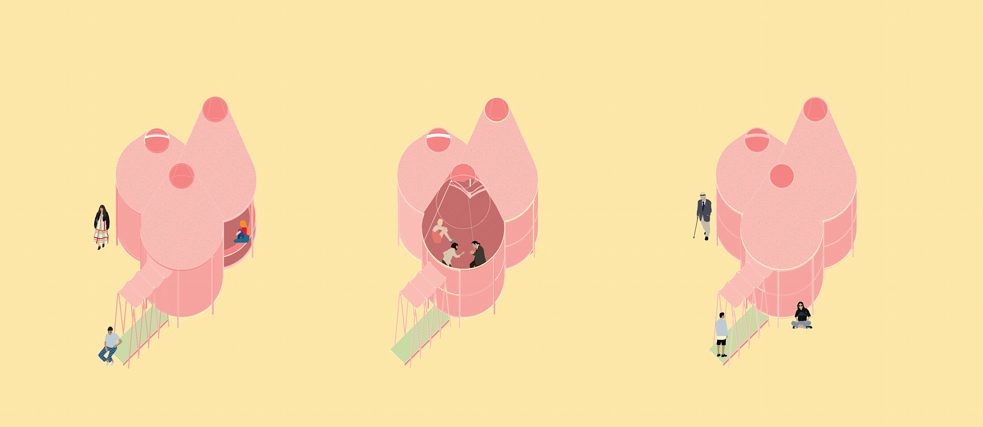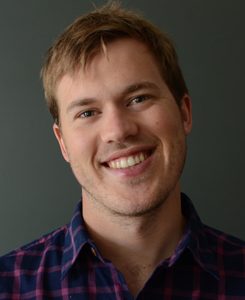Libraries as Learning Locations
“Knowledge for everyone, for free. Period”

Public and accessible meeting space becomes increasingly rare and high quality education remains out-of-reach for many people. Nico Koenig and Grif Peterson from “Peer 2 Peer University” talk about the potential of libraries as a shared space for community building and lifelong learning.
There is this persistant notion that the internet renders libraries irrelevant. Where do you see the role of libraries in our digital societies?
Grif Peterson: We are living in a time right now that is really frustrating. There are lots of organizations and projects that maintain a narrative of the internet and digital technology at large as a democratizing, liberating force for good. Simultaneously, many of these organizations embody undemocratic, un-liberating business models and ownership structures that is reflective of the neoliberal business models that pervade so much of the offline world. When you dig into what a lot of supposedly “disruptive” organizations and companies are doing – whether it’s through blockchain or online learning or app development – you’ll see that they are more often than not simply digitizing existing power structures and ways of being, rather than using digital technology to put forth a radical alternative. What this means, to us, is that spaces, online or offline, that seek to push back against the status quo of increasing inequality need to be nurtured, protected, and replicated.
This is where libraries come into play. In North America at least, libraries and religious institutions are basically the only places left that anybody – and we mean anybody – can walk into as they please without being hassled or asked to buy something. I think really owning and celebrating the role that the public library plays in modern society is crucial. In terms of learning, what we’re working on is figuring out ways to harness this community-wide mandate of libraries into grassroots learning programs that are led by the community. Programs that don’t require permission or licensing or a visiting scholar to get started. Documenting what comes out of these shared learning experiences is essential, as it reinforces the idea that everybody is both a consumer of and creator of knowledge.
Which role can or should libraries take on in the context of education?
Nico Koenig: Libraries have offered learning programs for a long time, but the future of the library as an education centre is not clear. Right now, the feeling is that, somehow, “learning at the library is just for fun”. That might be true for some people, but for others we know that libraries are helping people read, learn languages, gain difficult and complex skills, land meaningful jobs, and help people prepare for the future they want! Continuing with this idea, libraries and universities are both supporting students prepare for higher qualification degrees, both are offering professional development programs and both are even offering spaces for the same professors to give the same lecture! Of course, there are things libraries will be unlikely to start, like performing research and developing a trade school, but there is no hard line on that either. So, “long live the library” is an invitation to explore the wider possibilities and directions for libraries, not as a sideshow, but as leaders in the field education.
„Libraries as community spaces can do far more than direct people to a book or website that will answer their question“
Grif Peterson: The mission of libraries is far more radical than that of most universities – knowledge for everyone, for free. Period. In our work, we try to help libraries embrace the limitless potential of that mission, recognizing that libraries as community spaces can do far more than direct people to a book or website. Obviously many libraries have done much more than that for a long time, but in general we find that there is a lot of advocacy to be done to help the public realize how much is possible through the library.
What does this mean in practice? And how does your organization, Peer 2 Peer University, come into play?
Grif Peterson: For starters, we encourage librarians to consider that their library is a community space. Large library systems, especially, have trouble with this idea as individual local branches often do not have the mandate or the staff time to do community outreach. Certain policies too, like set daytime hours and strict rules of behaviour can set a tone that the library is not a welcoming space. We’ve noticed that a lot of librarians have a difficult time to know what to do with local community members or volunteers who say “hey, I have an idea to make this place better, can I help?”. There’s a lot of bureaucracy to navigate for sure, but one small step is to dedicate some time in trying to understand their community’s learning needs and gaps in ways that are fun and interactive, and step outside the traditional suggestion box.
When providing peer learning experiences, we try to support libraries to be both directive and open-ended. For example, if librarians bring 20 people together and say “ok, you all want to get better at public speaking ... go for it!”, a lot of people will feel overwhelmed and let down – they want someone to help guide their learning. But we also don’t want libraries to be too directive like typical universities, who tell people that they need to buy an expensive textbook, pay attention to an expert, and complete the same standard test.
Our goal with libraries is to develop programs that have enough structure as to help people get started on a right track, but open-ended enough that people can make the learning experience bend to their will, instead of themselves bending to the will of the class. This isn’t always easy. Drawing people into a circle is a great opportunity to question the concept of expertise and recognize that we are all simultaneously experts and novices. In general, we’ve had much more success developing this idea with library partners than with universities because, as we say above, this philosophy is completely aligned with the mission of libraries.
 Nico Koenig
| © Nico Koenig
Nico Koenig, Peer 2 Peer University, Community Lead
Nico Koenig
| © Nico Koenig
Nico Koenig, Peer 2 Peer University, Community LeadNico Koenig coordinates the learning circle program and supports the emerging community of educators and librarians involved with P2PU. He has a decade of experience in developing, coordinating and facilitating non-formal and community-based adult education curricula and projects.
 Grif Peterson
| © Grif Peterson
Grif Peterson, Peer 2 Peer University, Programs Lead
Grif Peterson
| © Grif Peterson
Grif Peterson, Peer 2 Peer University, Programs LeadGrif Peterson oversees the learning design and development of learning circles, including the selection and introduction of online courses, the design and development of support materials for facilitators and learners, and the delivery of training and onboarding for facilitators. He has cultivated relationships between P2PU and public libraries around the world, leading to lasting relationships with many systems including Chicago Public Library and Kenya National Library Service.
Comments
Comment